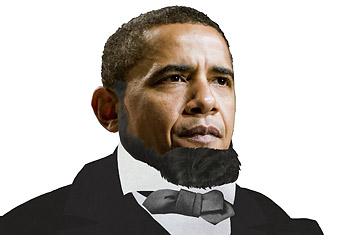
Barack Obama has never been shy about comparing himself to Abraham Lincoln. He did so when he announced his candidacy at the Illinois state capitol, where both he and Lincoln served in the legislature. "The life of a tall, gangly, self-made Springfield lawyer tells us that a different future is possible," Obama said. "He tells us that there is power in words ... He tells us that there is power in hope." That was, well, audacious, to say the least--and the comparisons have continued, on issues large and small. But the most important similarity, in Obama's mind, is how he plans to govern if elected.
Obama has said he admires Doris Kearns Goodwin's wonderful Lincoln biography, Team of Rivals. "He talks about it all the time," says a top aide. He is particularly intrigued by the notion that Lincoln assembled all the Republicans who had run against him for President in his war Cabinet, some of whom disagreed with him vehemently and persistently. "The lesson is to not let your ego or grudges get in the way of hiring absolutely the best people," Obama told me. "I don't think the American people are fundamentally ideological. They're pragmatic ... and so I have an interest in casting a wide net, seeking out people with a wide range of expertise, including Republicans," for the highest positions in his government.
But what does that mean? It has become something of a tradition for a President to claim bipartisanship by appointing stray members of the opposing party who either have a similar outlook or are tucked into the most obscure Cabinet positions; even George W. Bush hired Norman Mineta--remember him?--as Secretary of Transportation. Obama seems intent on going beyond that. "I don't want to have people who just agree with me," he said. "I want people who are continually pushing me out of my comfort zone." Obama said he'd be particularly interested in having high-ranking Republicans advising him on defense and national security. "I really admire the way the elder Bush negotiated the end of the cold war--with discipline, tough diplomacy and restraint ... and I'd be very interested in having those sorts of Republicans in my Administration, especially people who can expedite a responsible and orderly conclusion to the Iraq war--and who know how to keep the hammer down on al-Qaeda."
When I asked him specifically if he would want to retain Robert Gates as Secretary of Defense, Obama said, "I'm not going to let you pin me down ... but I'd certainly be interested in the sort of people who served in the first Bush Administration." Gates was George H.W. Bush's CIA director--and he has been a superb Secretary of Defense, as good in that post as his predecessor, Donald Rumsfeld, was awful.
No doubt, partisan Democrats who equate bipartisan government with namby-pamby policymaking are horrified by the thought that Republicans might keep control of the Pentagon. But Gates has been neither ideological nor namby-pamby. He has demanded accountability. He fired the Secretary of the Army after the Walter Reed hospital scandal and the Secretary of the Air Force for lax stewardship of the nuclear arsenal. Early on, Gates encouraged the withdrawal of U.S. troops from Iraq; he has been one of the few Bush officials open to negotiations with Iran. He has called for a larger budget for diplomacy--"which makes him far more popular than SecDefs usually are around here," a State Department official told me. He has clearly sided with the Army reformers against the Old Guard, and even called David Petraeus back to Washington to preside over a promotion board when it became clear that Petraeus-style officers--the bold and creative proponents of counterinsurgency strategy--were being blocked. (Petraeus apparently succeeded in getting several of his protégés promoted to general.)
Gates has been cagey about his future. He told CNN he would "never say never," but said staying on in the job was "inconceivable." However, with two wars in progress and the difficulty in getting new Cabinet (and staff) members confirmed quickly, there is a strong desire in the military community for continuity in the civilian leadership of the Pentagon. Associates say Gates might stay if he believed the security of the troops was at stake. The political rationale for a "team of rivals" government is compelling for Obama--it would be the freshest way to turn the page after the ideological myopia of the Bush debacle, a decisive step away from the partisan ugliness Americans claim to hate, the best way to build a decisive governing coalition. There are other worthy Republicans and military officers that Obama might turn to, people like Nebraska Senator Chuck Hagel or retired General James Jones, who would make an excellent National Security Adviser. But it is no small irony that if Obama really wants to make a clean break from his predecessor, he should start by retaining George W. Bush's Secretary of Defense.
